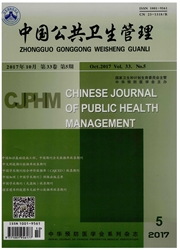

 中文摘要:
中文摘要:
目的了解太原市老年人认知功能状况及其影响因素,为有针对性制定减缓老年人认知损害,提高老年人认知水平的干预措施提供科学依据。方法2011年5月,应用蒙特利尔认知评估(MoCA)量表对太原市3个城市社区的290名60岁以上老年人群进行调查。结果调查的290名老年人中,认知功能障碍者260人,检出率为89.66%。量表的6个领域中,单项回答或者操作不正确的所占比例:短期记忆为94.1%,视空间领域为92.8%,执行功能为98.6%,注意力为89.3%,语言功能为96.9%,定向力为71.7%。多重线性回归分析结果,城市社区老年人认知功能影响因素为年龄、教育水平、经济来源、生活情况、听力、血糖,即年龄越大、文化程度低的、经济来源依靠子女的、与儿女共同生活的、听力差的、血糖高的老年人,其认知能力较低。标准偏回归系数:年龄为-0.288,文化程度为0.366,经济来源靠子女、靠自己和子女分别为-0.115、-0.126,与儿女同住为-0.124,听力为-0.148,血糖为-0.102。结论城市社区老年人的认知功能下降,单项回答或者操作不正确者所占比例较高的是执行功能、语言功能、短期记忆。年龄、文化程度是影响认知能力的主要因素。
 英文摘要:
英文摘要:
Objectives To investigate the status of the cognitive function among the community elders in Taiyuan city and to discuss the impact factors. Methods Two hundred and ninety community elders (i〉60 years old) were selected from 3 communities in Taiyuan city. MoCA scale was used to measure the cognitive function. Results The study found 260 eiders of cognitive impairment with detection rate 89.66%. The pro- portions of wrong answer/operation for the 6 domains were 94.1% (the short-term memory recall task), 92.8% (visuospatial abilities), 98.6% (executive functions), 89.3% (attention), 96.9% (language), and 71.7% (orientation), respectively. For the cognitive function among the com- munity elders in Taiyuan city, there were 6 influence factors (P〈0.05) including age, education level, economic sources, life style, listening, and blood sugar. The standardized partial regression coefficients were -0.288 (age), 0.366 (education level), -0.115 (economy depending on children), -0.126 (economy depending on children and oneself), -0.124 (living with children), -0.148 (listening), and -0.102 (blood sugar). Conclusion The cognitive function among the community elders in Taiyuan city declined. The highest proportions of wrong answer/operation in the 6 domains were executive functions, language and the short-term memory recall task. Age and education level were the main factors affecting cognitive ability.
 同期刊论文项目
同期刊论文项目
 同项目期刊论文
同项目期刊论文
 期刊信息
期刊信息
